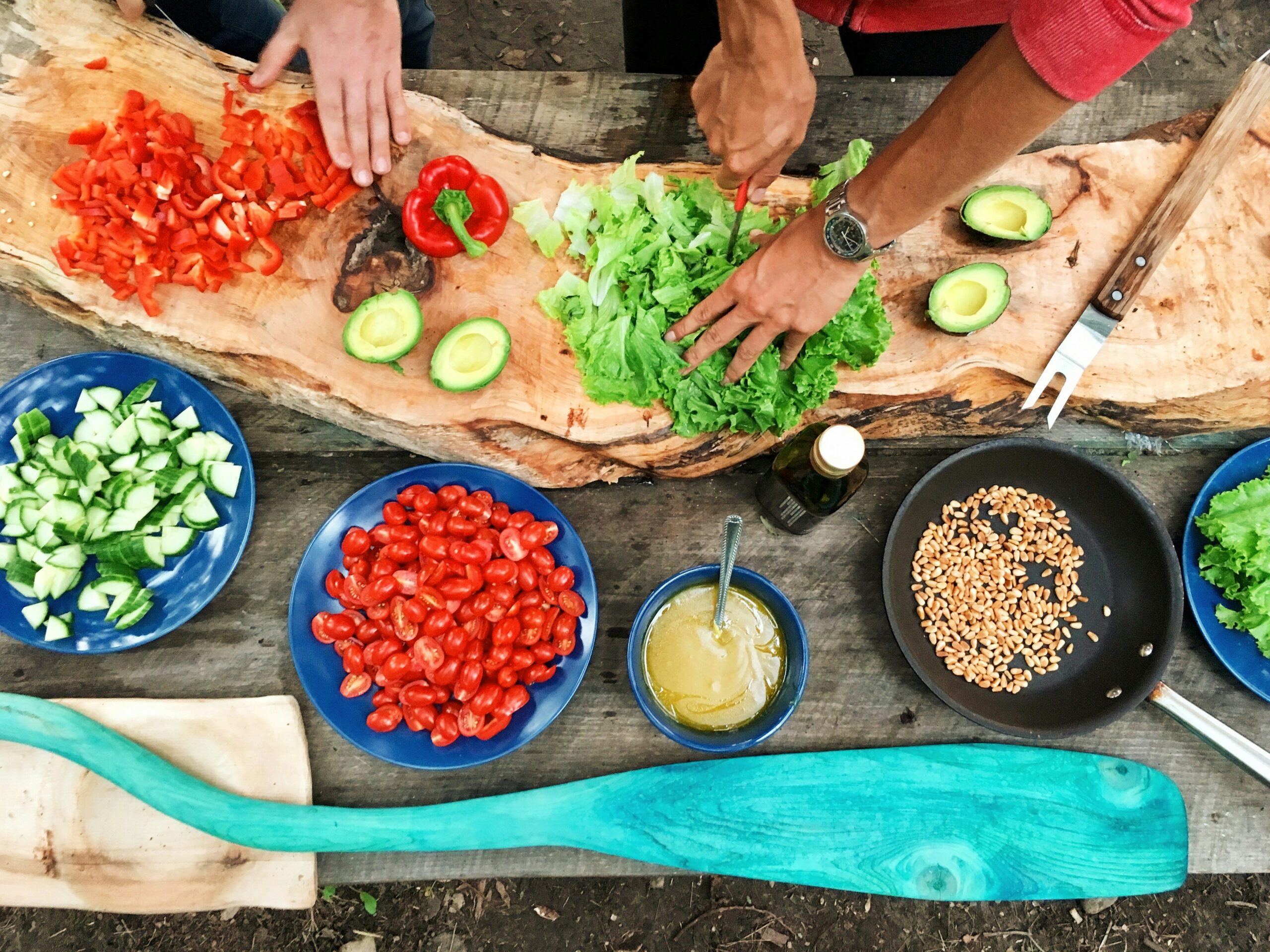My husband and I are one week into our Lenten intentions, and conveniently, both line up with two of the top five New Year’s resolutions Americans make: lose weight and improve diet. (We are abstaining from alcohol and working at least two plant-based meals into our meal plan each week of Lent.)
Feel like you’ve failed your New Year’s resolutions already, even though it’s only February? It isn’t too late! There’s never a bad time to get back on the good health bandwagon.
We’ve been talking about how you can meet your New Year’s resolutions by infusing purpose and meaning into those goals. “Lose weight” and “improve diet” are closely linked, so we’re lumping these two goals together to pack a one-two punch of creation care oriented strategies that can help you feel better physically while simultaneously benefitting the planet.
Pursue a Whole Foods, Plant-Based Diet
If you’ve been looking for ways to save money, reduce your impact on the planet, and improve your personal wellbeing, one of the most powerful ways to do so is by incorporating more plants into your diet. Plant-based diets rich in fruits, vegetables, legumes, and whole grains have been associated with lower rates of heart disease, type 2 diabetes, and certain cancers.
Consuming whole, unprocessed foods will also help you avoid the detrimental effects of additives and preservatives.
You can really up the ante on this goal by buying your produce in-season from local growers and at farmers markets, which keeps your food hyperlocal and fresh while also eliminating the need for lots of ground transportation and shipping to get that food to your grocery store.
If you want even more local produce, start your own garden! A simple herb garden on your kitchen counter, a container garden on your back deck, or a sprawling garden tilled from the lawn you used to have to mow all the time gives you direct access to fresh produce whose source you can trust, because you planted it. Not only does a garden give you the benefits of healthy fruits and vegetables, it also helps you exercise without even realizing it.
You don’t have to do everything all at once, so don’t get all anxious about this. I have a bad habit of trying to make massive changes all at once, and then I get overwhelmed and opt to order in fast food instead. Not that there’s anything wrong with that! That’s why we’re going from one to two plant-based meals a week instead of making a major swing to full-on vegetarian. I need some time to adapt, grow confident in my vegetarian food prep, and diversify our standard menu to fill it with foods we look forward to.
Choose Meats from Sustainable Sources
If you’re like me and a little intimidated by the idea of going full-on plant-based (but willing to try!), you can make wiser choices for your diet by choosing sustainably sourced meats.
Industrial agriculture accounts for the vast majority of meat (beef, pork, chicken, eggs) consumed in America, and it is also one of the greatest contributors to our warming climate. But farmers who follow regenerative agricultural practices offer more than just a feel-good product: meats raised in this way can influence its nutritional value, as well.
Sustainably sourced meat often comes from animals that are raised in more natural environments, which means they can exercise and function naturally. This movement increases their leaner muscle mass, which translates to lower fat content in the meat. Animals that graze on natural pastures produce meat with higher levels of omega-3 fatty acids, which contribute to better overall health. Because their diet is generally more diverse than industrially produced meat, these animals often have higher levels of essential vitamins and minerals as well. They’re exposed to fewer antibiotics and hormones and are less likely to be exposed to environmental contaminants.
Here again, seek out local butcher shops, like Marrow in Detroit, and farmers who are actively seeking better farming practices. At county fair time, consider bidding on locally raised animals.
Eat at Home More Than You Eat Out
I love to eat out just as much as the next person, but all that takeout, delivery, and fun dining does a number on both my waistline and my wallet. It’s also usually fast, which doesn’t mean good, enriching, fulfilling, or satisfying.
When I cook a meal at home, I am participating in an act of sacrifice that will provide sustenance for my family and friends. It is a joyful communion to serve good food to the people I love, and, bonus! It’s also better for everyone.
Eating at home gives you better control over the ingredients and cooking methods so you can prepare nutritious and well-balanced meals. All of that chopping and prepping and kneading is good for your muscles, too. Cooking at home is also often the most cost-effective, especially for a family of five, like mine.
It also allows you to manage portion control better, reducing the risk of overeating.
A word about portion control: I grew up in a “There’s starving children in China” house, and that “clean your plate” habit is a hard one to break. Our house rules have changed, from “clean your plate” to “don’t waste food;” if someone is full at dinner and there’s more left on their plate, we’ve taken to asking our kids to just put their food back into the fridge for when they’re hungry later. Leftovers are often a win for everyone. But also, maybe just stop putting so much food on my plate, Mom? Okay, I’m working on it.
Eat and Exercise As Part of Your Spiritual Practice
As the Corinthian church argued over what they could and could not eat, Paul instructed them, “So whether you eat or drink or whatever you do, do it all for the glory of God” (1 Corinthians 10:31 NIV).
You can do everything for the glory of God, including eating mindfully and exercising as an act of worship.
That moment before everyone starts eating? Use it to express gratitude for the gifts offered—for the people who prepared the meal, the people who harvested the food, the creation that sacrificed itself for our nourishment, and the God who breathed the breath of life into it all.
Choose exercises that bring you joy and help you connect with the beauty of creation. Take a contemplative walk, do yoga in nature, or hike a challenging trail. Let movement be a sacred expression of gratitude for the gift of a healthy body.
What ways have you found to improve your diet and lose weight that also honor creation? Do you have a local butcher, farmer, or baker that exemplifies sustainable practices? We’d love to hear about them! Share their story and tag them in the comments in our Instagram community.





 Copyright
2025
Root and Vine
Copyright
2025
Root and Vine